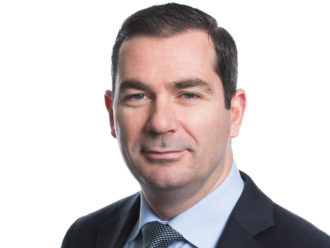What’s in your portfolio?
Our largest allocation is to equities – listed and private – which amount to around 60% of our portfolio. This is because being an open-ended scheme we are cashflow positive and until the recent economic turmoil we were expecting to be cashflow positive through to 2029, although that may become a challenge due to the inflation outlook. But, it is worth saying that, even if we weren’t cashflow positive, we would still want to be exposed to growth assets.
Looking at our overall portfolio, we also have 15% in alternatives, including property. Our bond allocation is in multi-asset credit where we have exposure to lots of different fixed interest assets, capturing income and capital appreciation – and which offer us other forms of return with different risk premia.
The only gilts we hold are to match the payments to the employees in our scheme who are exiting. We set that aside in the portfolio to match that liability profile. That is only about 3%. We never expect it to be more than 5%.
What type of equities do you hold?
It is a mix. We have 16% in UK equities, which is a legacy of a tradition of home bias in local government pension schemes. Although we would want to have some weighting in the UK, 16% is probably too much, and we will be recommended changing that to the committee. The rest is global equities.
We are moving more into emerging markets. We still see that as a good opportunity to provide diversification and returns. It is a global portfolio. We have some passive regionally managed portfolios, but not much.
Could you expand on the changes?
The relationship we have with our pooling company [Border to Coast] is interesting. We are owners and customers. We work with our 10 partner funds to build products that are suitable for our respective strategies. We have been looking to build regional products. We have not found the sweet spot yet, either for ourselves or our partner funds, so we will remain in equities, within a more global allocation, and, as I say, emerging markets.
Which emerging markets are of interest?
This leads into the China question. And we cannot ignore it. We are wary of having an allocation to China commensurate to where we see their GDP. But it is in China and the Asia-Pacific region where you would expect to see us in that asset class. China is Schrödinger’s investment proposition. It’s a dilemma: but it offers great opportunities, so we cannot ignore it.
Given those dilemmas, how important is ESG to you?
It underpins everything we do. We have an engaged set of committee members. We see it very much as ingrained in all our decisions. We do not have a proportion of the portfolio focused on it, say for impact. Instead, we think it should run through everything we do. Good ESG is consistent with our fiduciary duty and good outcomes.
Was that something you introduced to the fund, or has it always been there?
I inherited a committee that was committed to that approach. Three years ago, we sought independent research to map our investment portfolio in comparison to the United Nation’s Sustainable Development Goals (SDGs). As the committee was keen that we try to look at the interdependencies of ESG, around climate change, for example.
More than 50% of our portfolio was mapped positively with the SDGs. I suppose we have long been advocates of what is now described as a ‘just transition’. As a fund we first provided a TCFD report voluntarily in 2019, because we recognised the importance of understanding climate risks and opportunities as an investor. I would not say we were trailblazers, but I think we were the first to look at our investment universe through the sustain- able development goals lens.
What about Cop27? Was there anything to excite you?
I was slightly disappointed. The 1.5-degree goal is a tangible target for investors, so it is a shame it has not been built on. It is going to be down to individual funds, trustees and investment companies to move that process on. We needed to build on the Paris-aligned measures, but that did not come out.
Are you considering adjusting your portfolio due to the economic outlook around inflation and recession?
I would not say we have to adjust it – but we may have to bring forward some of our tactical thinking, as we will have to pay around another 10% to our pensioners from April. That will be a significant impact on cashflow.
Whereas we have been considering turning the distribution or income taps on at a certain period of time, we are undertaking a pretty comprehensive review of our asset allocation to make sure it is nimble enough to meet those cashflow demands.
The pressure of the J curve is significant. We need to undertake some tactical analysis of that to make sure the cashflow situation is in hand.
In which direction are you likely to move?
We will turn the income tap on – which could be in real estate – but we need to match that tactically with our equity portfolio.
What worries you most about the economic situation?
The cost of living crisis. The demography of the people in the scheme are some of the lowest paid people in the country. The concern for us is making people aware of the pension options available.
Pensions are deferred pay, so by opting out of schemes people are effectively turning off deferred pay from their employer. My biggest concern is how the cost of living crisis manifests itself in short-term decisions that could have long-term effects on individuals and society in general.
Were you affected by the crisis that engulfed some pension funds following the mini budget?
We were okay. We do not have those liability driven investment instruments in place. We are not geared at all. We were only exposed via the general market. And, as I mentioned, we have only a small allocation to gilts. In fact, if anything, the value of gilts made the exit for those leaving the scheme more palatable.
What did you make of that short-lived crisis overall?
There can be a tendency to over engineer financial products. It could be down to the bright young things in the UK leaving Oxbridge and going into the City instead of doing something like science research, as used to be the case.
And with these products, trustees need to take a step back and understand what they are being sold and what they are investing in.
Since you joined Surrey in 2015, what has been your biggest challenge?
I have a clear and passionate vision on the management of pensions: that they should be fully integrated and include all parts of the production of pensions for members. So people can see from the contributions they pay into the investment universe – is all integrated as one. Getting that sorted and the right people in place has been a big challenge. We are going in the right direction at Surrey, but we have some way to go. But it is something we need to respond to as an industry.
What has been your experience of the local government pension scheme pool?
It is incredibly collaborative. Pooling has helped that. We have 10 other local government funds that I speak with on a regular basis. We can look at issues from different directions, as it is regionally diverse. I would recommend anyone to be part of it.
You are chair of the PLSA’s Local Authority Committee. What does that entail?
It is an incredible honour to represent my colleagues. From my perspective, the PLSA policy board helps to support the PLSA in the direction in which it takes. My role, in the best way I can, is to make as much noise on behalf of my local government scheme colleagues to ensure we have a rightful place in the PLSA’s plans.
What are you expecting from the government’s pooling consultation?
We are waiting to hear back from the government on pooling and good governance. We are keen to hear what is happening, as funds need to know the trajectory of travel on pooling. With pooling, from the outset there has been real support for the project. But it simply comes down to if we want to move the local government pension scheme pool in the right direction we need a clear view to come from the top.
What have been the most fundamental changes that you have experienced?
For the better: the quality of governance. As a result of the LGPS pooling, governance has improved beyond recognition. The promotion of the Local Pensions Board was not universally welcomed, but if you have a Local Pensions Board run in the right way it provides that additional layer of scrutiny, assurance and support for trustees that they would not otherwise have.
The worst is that there is too much emphasis on the super sexy side of the business. By which I mean discussion about asset allocation and returns. Yes, we need them. They are incredibly important, but then we also need to talk about paying people the right money at the right time. I am not sure the balance is quite right. It is about making the pensions administration side of things better. That is our interface with members, and it is all about the most important thing: paying people their pensions.
What has been your greatest achievement?
Probably it comes down to the two last years. It is surrounding myself with people who are much better than me. That is my greatest achievement: putting a team together that are strategically fantastic and great with their teams.
What do you see as the biggest challenges on the horizon?
As always with pensions, the challenges are the unknown unknowns. The next Black Swan event: that thing we cannot predict. But what you can do is make sure you are nimble enough as an organisation to deal with it when it comes, so you can respond to it adequately.
NEIL MASON’S CV
July 2021 – present
Assistant director – LGPS senior officer
Surrey Pension Team
December 2019 – June 2021
Strategic finance manager – pensions
Surrey County Council
December 2017 – November 2019
Head of pensions
Surrey County Council
January 2015 – December 2017
Senior specialist adviser
Surrey County Council
September 2013 – January 2015
Strategic pensions manager
London Borough of Hounslow
April 2009 – September 2013
Pensions officer
London Borough of Hounslow
October 2008 – January 2014
Founder member
2plan Wealth Management
November 2018 – present
Policy board member
Pensions and Lifetime Savings Association
July 2015 – present
Vice chairman of the Local Pension Board
London Borough of Hounslow





Comments